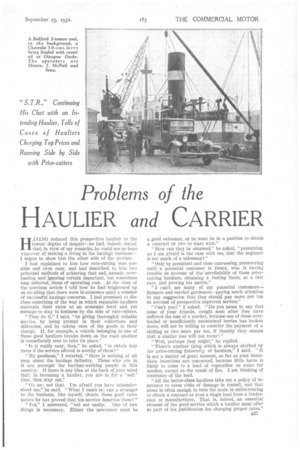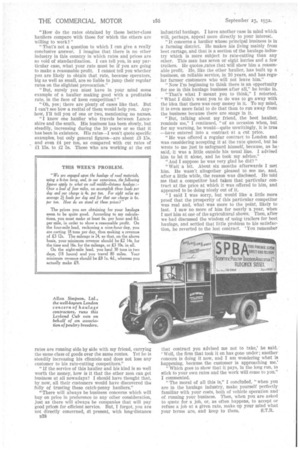Problems of the
Page 55

Page 56

If you've noticed an error in this article please click here to report it so we can fix it.
HAULIER and CARRIER " S.T .R.," Continuing His Chat with on Intending Haulier, Tells of Cases of Hauliers Chorging Top Prices and Running Side by Side
with Price-cutters
HAVING reduced this prospective haulier to the lowest depths of despair-:--he had, indeed, stated that, in view of my remarks, he could see no hope whatever of making a living in the haulage business— I began to show him the other side of the picture.
I had explained to him how rate-cutting was possible and even easy, and had described to him two principal methods of achieving that end, namely, overloading and ignoring certain important, hut sometimes long deferred, items of operating cost. At the close of the previous article I told how he had brightened up on recalling that there were in existence quite a number of successful haulage concerns. I had promised to disclose something of the way in which reputable hauliers maintain their rates at an economic level and yet manage to stay in business by the side of rate-cutters.
"They do it," I said, "by giving thoroughly reliable service, by being prompt in their collections and deliveries, and by taking care of the goods in their charge. If, for example, a vehicle belonging to one of these good hauliers breaks down on the road another is immediately sent to take its place."
"Is it really easy, then," he asked, "to obtain fair rates if the service offered is worthy of them?"
"My goodness," I retorted, "there is nothing at all easy about the haulage industry. Those who are in it are, amongst the hardest-working people in this country. If there is any idea at the back of your mind that, in becoming a haulier, you are in for a 'soft' time, then stay out."
"Oh no; not that. I'm afraid you have misunderstood me," he said. "What I mean is: can a stranger to the business, like myself, obtain these good rates before he has Proved that his service deserves them? "
"Yes," I answered, "but not easily. One of two things is necessary. Either the newcomer must be a good salesman, or he must be in a position to obtain a contract or two to start with."
"How can they be obtained," he asked, "presuming, as I am afraid is the case with me, that the beginner is not much of a salesman?"
"Only by persistent and close canvassing, persevering until a potential customer is found, who is having trouble on account of the unreliability of these pricecutting hauliers, obtaining a footing there, at a fair rate, and proving his mettle."
"I can't see many of my potential customers— farmers and market gardeners--paying much attention to any suggestion that they should pay more per ton on account of prospective improved service."
"Can't you?" I asked. "Do you mean to say that some of your friends, caught soon after they have suffered the loss of a market, because one of those overloaded or insufficiently maintained lorries has broken down, will not be willing to consider the payment of a shilling or two more per ton, if thereby they ensure that a similar loss will not recur?"
"Well, perhaps they might," he replied.
"There's another thing which is always shirked by the price-cutting fraternity of hauliers," I said. "It is not a matter of great moment, so far as your immediate intentions are concerned, because little harm is likely to come to a load of vegetables en route for market, except as the result of fire. I am thinking of insurance of the load.
"All the better-class hauliers take Out a policy of insurance to cover risks of damage in transit, and that alone is often enough to turn the scale iii endeavouring to obtain a contract or even a single load from a tradesman or manufacturer. That is, indeed, an essential element of the good service which a haulier must offer as part of his justification for charging proper rates." "How do the rates obtained by these better-class hauliers compare with those for which the others are willing to work?"
"That's not a question to which I can give a really conclusive answer. I imagine that there is no other industry in this country in which rates and prices are so void of standardization. I can tell you, in any particular case, what your rate must be if you are going to make a reasonable profit. I cannot tell you whether you are likely to obtain that rate, because operators, big as well as small, are so liable to jump their regular rates on the slightest provocation."
"But, surely you must have in your mind some example of a haulier making good with a profitable rate, in the face of keen competition?"
"Oh, yes; there are plenty_ of cases like that. But I can't see how a recital of them would help you. Anyhow, I'll tell you of one or two, mentioning no names.
"I know one haulier who travels between Lancashire and the south, His business has been slowly, but steadily, increasing during the 10 years or so that it has been in existence. His rates—I won't quote specific examples, but only general figures—are about £3 15s. and even £4 per ton, as compared with cut rates of £1 15s. to £2 5s. Those who are working at the cut rates are running side by side with my friend, carrying the same class of goods over the same routes. Yet he is steadily increasing his clientele and does not lose any customer to his rate-cutting competitors."
"If the service of this haulier and his kind is so well worth the money, how is it that the other men can get business at all nowadays? I should have thought that, by now, all their customers would have discovered thG folly of trusting these catch-penny hauliers."
"There will always be business concerns which will buy on price in preference to any other consideration, just as there will always be companies that will pay good price's for efficient service. But, I forgot, you are not directly concerned, at present, with lonrdistance B38 industrial haulage. I have another case in mind which will, perhaps, appeal more directly to your interest.
'It concerns a haulier whose principal business is in a farming district. He makes his living mainly from beet cartage, and that is a section of the haulage industry which is more subject to rate-cutting than any other. This man has seven or eight lorries and a few trailers. He quotes .rates that will show him a reasonable profit. He, like the other haulier, has built up a business, on reliable service, in 10 years, and has regular farmer customers who will not leave him."
" Now I'm beginning to think there is an opportunity for me in this haulage business after all," he broke in.
"That's what I meant you to think," I retorted. "What I didn't want you to do was to go away with the idea that there was easy money in it. To my mind, It is even more fatal to do that than to run away from the business because there are snags in it.
"But, talking about my friend, the beet haulier, reminds me," I continued, "of an occasion when, but for my warning, he would—quite unwittingly, it is true —have entered into a contract at a cut price.
"He was offered a regular contract to London and was considering accepting it at the rate quoted, but he wrote to me just to safeguard himself, because, as he said, it was a little outside his usual line. I advised him to let it alone, and he took my advice."
"And I suppose he was very glad he did?"
"Wait a bit. About six months afterwards I met him. He wasn't altogether pleased to see me, and, after a little while, the reason was disclosed. He told me that a competitor had taken that particular contract at the price at which it was offered to him, and appeared to be doing nicely out of it.
"I said I was sorry, but would like a little more proof that the prosperity of this particular competitor was real and, what was more to the point, likely to last. I saw no more of him for nearly a year, when I met him at one of the agricultural shows. Then, after we had discussed the wisdom of using trailers for beet haulage, and settled that little problem to his satisfac-tion, he reverted to the lost contract. 'You remember
that contract you advised me not to take,' he said. 'Well, the firm that took it on has gone under ; another concern is doing it now, and I am wondering what is happening, because the customer is approaching me.' "Which goes to show that it pays, in the long run, to stick to your own rates and the work will come to you." I commented.
"The moral of all this is," I concluded, "when you are in the haulage industry, make yourself perfectly familiar with your costs, both of vehicle operation and of. running your business. Then, when you are asked to quote for a job, or, as often happens, to accept or refuse a job at a given rate, make up your mind what your terms are, and keep to them. S.T.R.






































































































